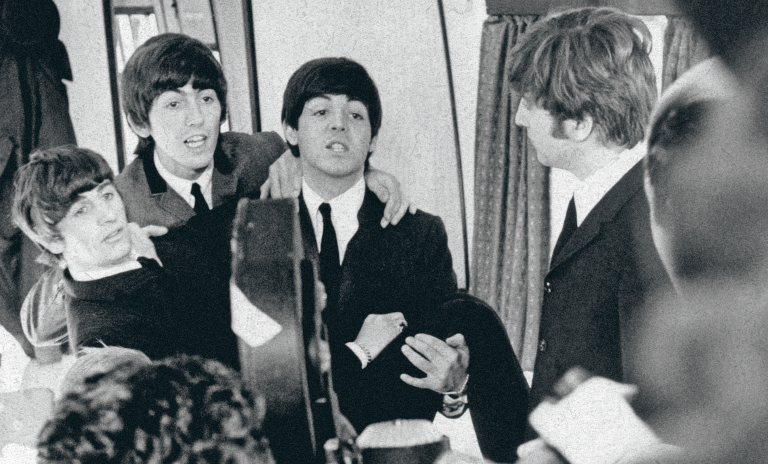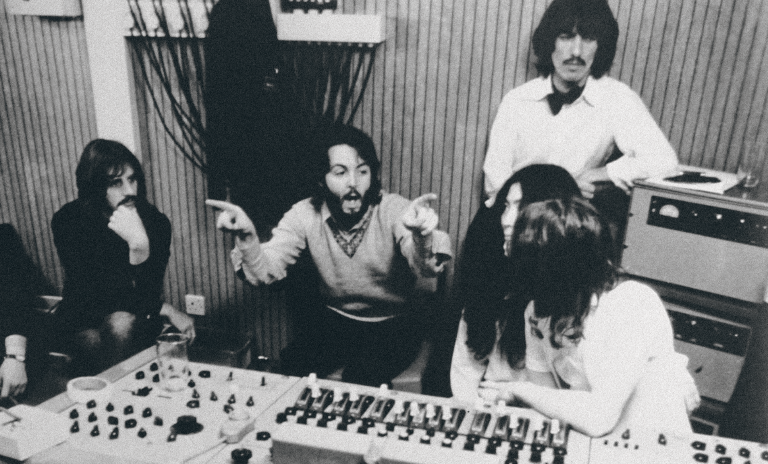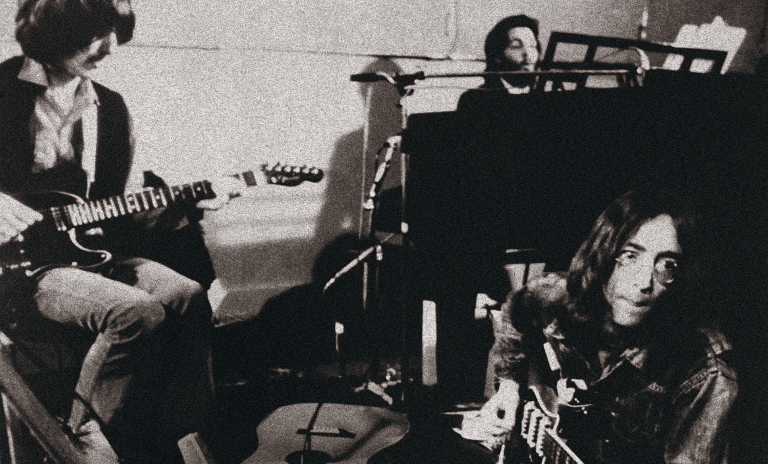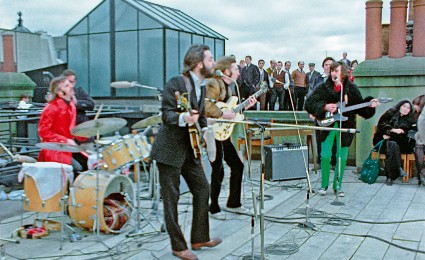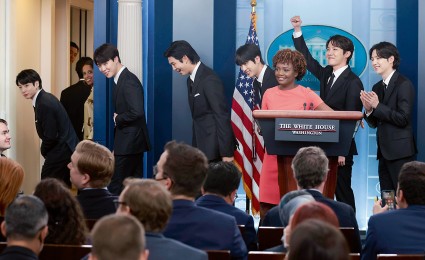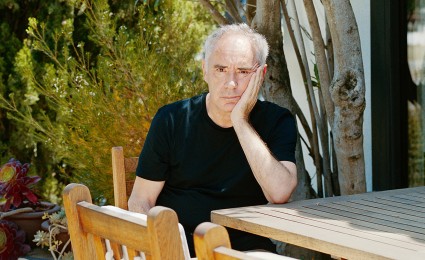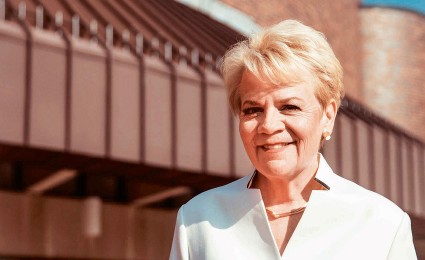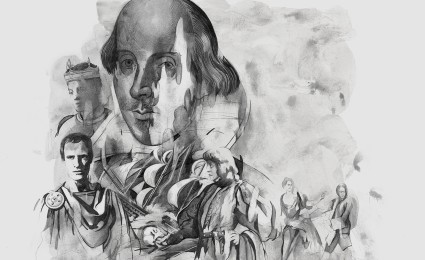

Think:Act Magazine “Art and Business”
What businesses can learn from the Beatles

Think:Act Magazine
How the Beatles defined an era of music and perfected a fruitful business model
by Mark Espiner
Photos by Philip James Griffiths / Magnum Photos / Agentur Focus
Read more on the topic “Art and business”
They made music together for less than a decade. But in that stunningly brief time, the Beatles broke records and defined an era. They created a cultural landscape and achieved unparalleled global success which persists 60 years later. It's not all about the music though. Their story provides valuable lessons for business leaders too.
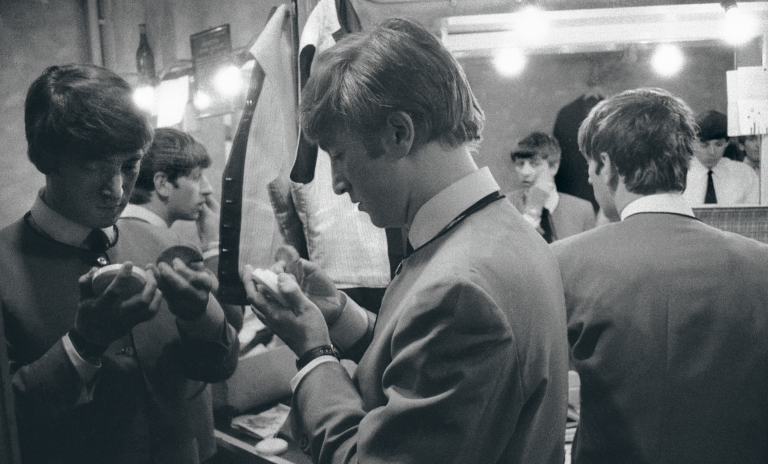
One, two, three, FOUR!
"When John and I were kids in our early twenties," Paul McCartney confides to me, in a long and winding conversation about how the Beatles created their distinctive music, "we heard that the pharaohs of ancient Egypt had scribes to write things down." He becomes very animated at the memory. "We thought: We’d be pharaohs!" he says in a triumphant voice, explaining that he had never wanted to learn how to write the notes down and emphasizing instead how the most successful band of the 20th century made music by collaborating and creating together, without the need for the academic process of scoring and notation.
To find your purpose connect with your past. If you are struggling to see where to go next, get back. Remember where you came from and what it has taken for you to get from there to here. Try to recapture something of what drove you to create in those early days and build it into your mission.
It was a recipe that worked. In their eight short years recording together, Lennon and McCartney wrote close to 300 songs, produced 13 multimillion-selling albums and scored 20 number one hits. Until recently, however, there has been no real window on their creative process, no revelations of the secrets of their success besides the flawed 1970 documentary film Let It Be. It was an early example of a "fly-on-the-wall" exposé and when it was released in 1970, after the band had broken up, it seemed to show the breakdown of communication between the four musicians. That was the received wisdom. The truth is a little different.
When Oscar-winning Lord of the Rings director Peter Jackson was asked to make a new film and was given access to the original film footage tracking 21 days in January 1969, another story started to emerge. As he trawled through the 60 hours of filmed material, instead of finding angry disaffected bandmates arguing with each other, he saw joyful creativity, dynamic music making, ambition, risk-taking, vision and determination. The result was Get Back, a three-part miniseries – a stunning document that casts light on how they worked.
The eight or so years the Beatles spent at the top of charts – and the decades of success that followed – provide a legacy full of lessons. Business leaders should also take note. From their first tentative recordings to the final court case to conclude their split, there is plentiful evidence of a group at the top of their game. Here we look at what a world-class team does to overcome obstacles and instinctively focus to ensure success. In short, the Beatles story offers us a lesson in management style, productivity and innovation.
Get back to where you once belonged … (and don’t forget why you’re doing it)
As the technicians set up the drum kit and load in the speakers on January 3, 1969 at Twickenham Film Studios, where the band are being filmed in rehearsal for the Let It Be film project, guitarist George Harrison looks on and says they could set up a stage and an amplification system just like they had in the Top 10 Club in Hamburg. It's a throwaway line, but it taps into the deep roots of the band. Because Hamburg was where the band forged their sound and skills.
Innovation needs support: simple and specialized like Paul McCartney's scribe catching lyrics as he extemporizes them. Don't limit the great talents you might have in the room, help them with as much assistance as you can afford.
As John Lennon put it, before they went to Hamburg they played hour-long shows, but in Germany they were on stage sometimes for eight hours. "We got better and got more confidence. We couldn't help it with all the experience playing all night long," Lennon said. Malcolm Gladwell's bestselling book Outliers cites the Beatles' Hamburg days as going some way to providing the band with the crucial 10,000 hours of practice to hone their craft to perfection. The Beatles went to Hamburg five times between 1960 and 1962. On their first tour of duty they played a staggering 106 nights for five or more hours per night.
George's wish to recreate the feel of those Hamburg days by rebuilding the stage says something about wanting to get back to the band's roots. And his isn't the only expression of that same desire. Throughout the days of playing and recording, the band constantly circle back to the songs that they played in their Hamburg days, with tunes from the old rock'n'roll standards that they played night after night in the small hours and long shifts of playing. They play them for fun, to pick up the pace, to reminisce. In a bid to capture that early edgy energy, perhaps, the band dusts off an old Hamburg-era song of theirs, One After 909, which predates their first records and they have never released. You can see the band wake up as they play it – and as they perform it for what is probably the first time in a decade, it captures the mood of the band as it was almost ten years before. When they perform it at the rooftop concert it brings the youthful vitality of their early days into their last more mature performance.
Help! I need somebody … (why we all need support systems)
While the technical team didn't immediately take up George Harrison's suggestion to recreate the stage of the Hamburg nightclub the Beatles played at in 1960, they did nevertheless go the extra mile in providing crucial support systems that ensured the smooth running of the creative process – or at least helped to make the artists comfortable enough to be able to create.
Some might at first seem trivial or banal, but they are in fact key components for success. For example, Mal Evans and Kevin Harrington are credited as "roadies" in the film and their presence in the room feels constant. They seem innocuous and their help isn't obvious at first, but they are in fact catching every request and oiling the wheels of the creative Beatles machine.
Kevin, for example, is often seen bringing in tea and toast, sandwiches, orange juice – making sure that sustenance is at hand. Hydration and energy bursts help creative action and stopping for a quick bite or drink can provide just the right amount of space for an idea to emerge. If those breaks are on hand and on tap then the breakthrough moments are more likely.
Mal acts like a scribe for Paul McCartney – fulfilling his early wish to play the pharaoh – taking dictation for lyrics and scribbling them down on a clipboard before typing them up for the singer to perform with. When McCartney casually says they should have a hammer and anvil to produce a sound effect for his new song Maxwell's Silver Hammer, they magically appear within hours. This kind of sensitivity and speedy response keeps the creative flow going and while the support of toast and marmalade might seem trivial, it is in fact vital.
When you are creating or innovating, a coordinator with a talent for listening can be indispensable. Find the person who can catch the gold as it falls from the creatives – and who can draw the most out of the best talent.
… Help! Not just anybody … (or why producing talent matters)
Help during the sessions for Let It Be comes in many forms. Not just tea and toast, of course. It also comes in being able to get the ideas down. And that is the role of a producer. In Get Back you can see two producers at work. George Martin, who produced all of the Beatles work, is on hand, but he is taking a back seat to a younger producer, Glyn Johns, who is more in control for this project. Both are in the rehearsal room observing and listening to the music, trying to help improve it and being ready behind the taping machines when the band is ready to press the red button – and even to record them when they are not aware in case it is an unrepeatable gem.
But the role of a talented producer has been part of the Beatles history from day one. Paul McCartney is very ready to credit the producer's role but also quick to put me straight on where the actual creative ideas come from. "The producer's role isn't necessarily to come up with ideas. I think that is one misconception – that the producers gave us the ideas," he says. He then goes on to articulate perfectly how the overseeing role of a producer enables the creativity of the group to flourish. He recalls how George Martin was in the Royal Navy before he was a producer. "I asked him what he did and he said he was an observer. And I said what is that?" McCartney recalls. "So I said: You didn't navigate. He said that's true. You didn't fly the plane. That's true. You didn't do this, that and the other, but you observed. So if you think about it that's what a producer does. He doesn't fly the plane, but he's in charge. He was the perfect producer in the entire galaxy for the Beatles. There couldn't have been anyone more ready to produce the Beatles."
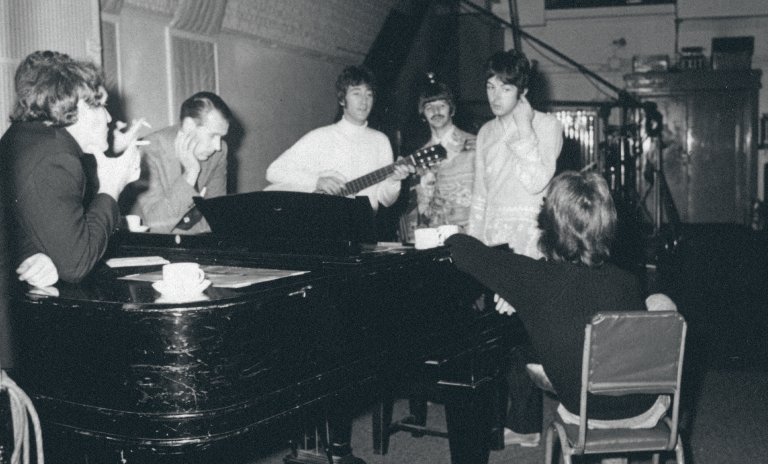
Know that the best teams are greater than the sum of their parts. Engender that spirit and introduce catalysts to enhance and reinforce the dynamics of a successful working group.
With a little help from my friends … (enhancing teamwork and collective intelligence dynamics)
After they split up, none of the Beatles went on as individuals to repeat the success they had enjoyed as a group. All of them might have had their own hits (to a greater or lesser degree), but arguably nothing on the scale they had created together. Their example seems to prove the rule: A good team is greater than the sum of its parts. Nevertheless, the Let It Be project exposed cracks in their relationship with an actual split occurring only a few days into rehearsal. It takes a special kind of internal process – and bonds built up over the years – to help resolve that kind of conflict. But there is a question that hangs over the Beatles: Could a group of such stellar talents and high achievers be hard to manage?
Anita Williams Woolley, an associate professor at the Carnegie Mellon Tepper School of Business and the co-author of Collective Intelligence in Teams and Organizations, has some useful observations. In sports teams, she says, you can sometimes have "too many stars," which leads to people's talent being used to figure out who should be the leader. In addition to that, you might have "two very talented people who are also vying to be in control." The partnership of Lennon and McCartney didn't seem to suffer that problem, but with the further talents of Harrison and to a lesser extent Ringo, then a problem can arise. The way to solve this, she suggests, "is if you can make their work less interdependent so they don't have to deal with each other so much." The Beatles instinctively seem to do this. Each of them working discretely on their own songs before sharing them with the group, thus reducing potential frictions.
"The producer's role isn't necessarily to come up with ideas. I think that is one misconception – that the producers gave us the ideas."
Then there is also great value in shaking up the team – or gently provoking it to be more productive by introducing outsiders. A different "thinking style" from outside an established group can "enhance the ability of the other people to collaborate." Woolley's own work has also seen the benefit of female presence in a group. "What we have observed over time is social perceptiveness – which is a specific ability within social intelligence. Women show more strengths in this than men. And that seems to be a big part of the reason for having more women in a group – it makes people more attuned to verbal and nonverbal cues about what other people are feeling or thinking." That female presence also has a different impact. "Both men and women behave differently in same-sex groups than they do if you bring in one member of the opposite sex," says Woolley. "The same-sex group is often not as well-behaved if it's just the girls or the boys."
Both of these elements seem to be at play in the Beatles group in Get Back – although probably unwittingly. John's partner Yoko Ono is a benign female presence in the room during filming – and she is perhaps altering the dynamic for the better. And Black keyboard player Billy Preston, who had shared the stage with them in Hamburg and who is invited in almost as "a fifth Beatle," not only offers a direct channel to their shared past, but brings a diversity that didn't exist before. The mood in the room visibly and audibly changes with his contribution.
I’ve got a feeling … (some Beatle lessons in productivity)
Perhaps the most startling, and useful, element from the eight or so hours of witnessing these musicians at work, is what you can learn about productivity from the Beatles process. The group display a number of tricks and techniques that open up creativity and innovation.
Switching from one song to another as a means of warming up, the band can be seen rapidly writing music and trying song ideas out immediately, reiterating the good points and eliminating the bits that don't work. When he's stuck for a few minutes and desperate to come up with material, Paul McCartney brings the song Get Back to life in front of everyone's eyes. It's like a magic trick, but it comes from keeping up energy and focus and speed.
Productivity and creativity is in the playing. Don't be frightened to play and don't judge your work too quickly, but do know when to stop.
In contrast to this rapid prototyping method, they also use long gestation periods, allowing a song to cook. A little bit of work on it today, bring it out later tomorrow. Or as John and Paul work on Don't Let Me Down, contributing ideas and bouncing back and forth, George says, "I think it's awful actually." Their reaction is swift: come up with something better then. That is a useful rule; don't just destroy: create.
They also keep their eyes open, from following the newspaper to fuel lyrics for a song to looking at what the actual building they are in can offer as a performance space – including the roof, which then served as the iconic performance piece of the Beatles' whole career.
As their deadline looms, McCartney reaches for order. "We can't carry on like this indefinitely," he says. "What we need is a serious program of work. Not an aimless rambling. What we need is a schedule." John's reaction is harsh and a little deluded: "You're hard to live up to, Paul," he says. But they do impose a structure just in time to pull all their ideas together into a cohesive performance.
Don't sit back, keep on creating. Keep on making. Keep on innovating. Never stop.
The long and winding road … (Paul McCartney's life in music is an inspiration for all managers)
John might have found it hard to live up to Paul's ambition, but Ringo could see the positive productivity Paul brought to them all. "If Paul hadn't been in the band," he said recently, "we'd probably have made two albums, because we were lazy buggers." Paul drove the band. Before the Beatles he had drive, and it was undimmed after their demise too. He carried on making music including three solo albums where he plays all the instruments. He's played in most countries around the world, toured the US in 2022 and played at the UK Glastonbury Festival just a week after his 80th birthday.
He was the de facto manager of the Beatles in the latter stages of their career; it wasn't a role he was comfortable in, he didn't like "being the boss" and he has been held responsible by some for breaking up the band. But his life's work is unparalleled, the fruits of his labor – both creative and financial (he is music's first billionaire musician) – unsurpassed.
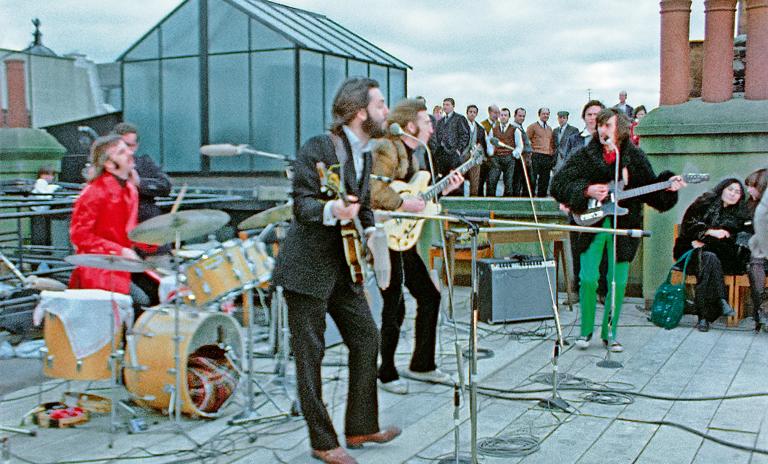
Information is gold. Catch all the data. Catch as much of it as you can. You might not have the tools or be able to make sense of everything now, but someday someone else might.
I saw a film today, oh boy … (why content is king and data is everything)
In eight or so hours Get Back reveals, in slow motion, the creative vision of the Beatles at a unique point in their history. But Get Back is also in and of itself a creative vision – and a work of art. Jackson has taken the original Let It Be film and the footage shot for it and reconstructed a compelling narrative. He drives his film with a looming deadline and creativity under pressure plus the ticking time bomb of a band about to implode – all of which makes a gripping story.
But unlike the Beatles who let their music flow, Jackson is not creating something out of nothing. He's working with the material that the original 1969 director Michael Lindsay-Hogg filmed. And if Lindsay-Hogg had not been so meticulous and ambitious, we would not have the epic narrative and historical document that Jackson has delivered.
For the whole rehearsal process, Lindsay-Hogg used multiple cameras filming almost constantly for three weeks. The result is that a film that feels driven by short-term time pressure is itself an example and a revelation of long-form creativity. Without the hours and hours of footage, we would not see the process, nor experience the extraordinary emotional pay off as everything coalesces in the rooftop concert which finally makes sense of all the tortuous wrangling that preceded it.
Jackson's other epics include They Shall Not Grow Old, a documentary of the First World War. It has a similarly immersive quality where he pulls together thousands of sources to make the film. In Get Back, it's hundreds of hours of audio and images which recreate the world in front of our eyes. Without those precious hours of film and the multiple camera angles, Get Back wouldn't be half the film it is.



